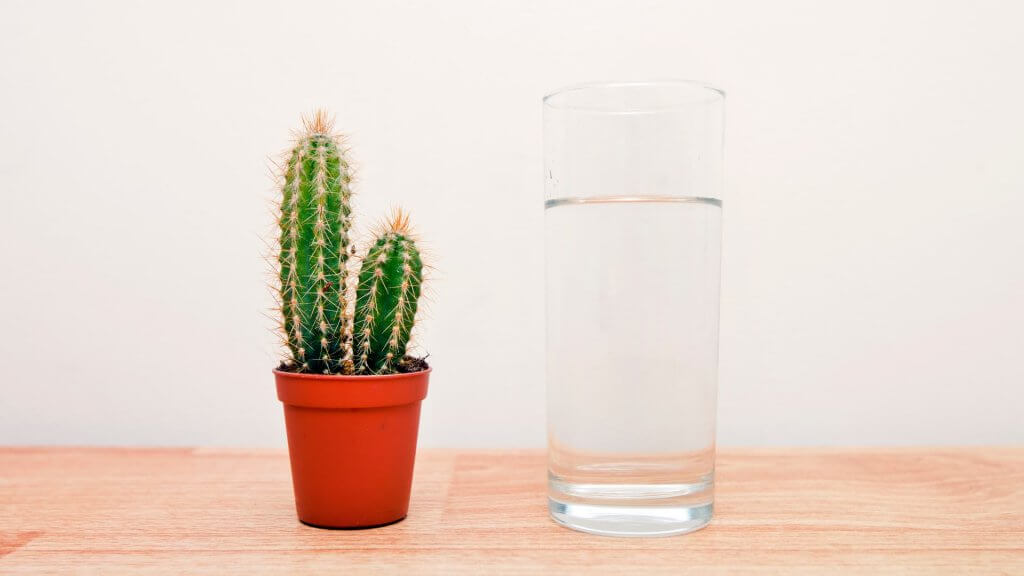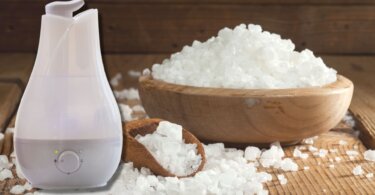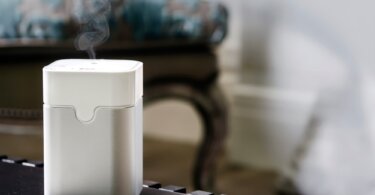Do you live in a humid climate? The excess humidity levels can take their toll on you. You tend to sweat a lot and feel uncomfortable. And the high humidity levels can trigger harmful mold and mildew growth and possible structural damage to your house.
This is when you may consider buying a dehumidifier to reduce the humidity levels in your home and reduce dust mites and mold buildup. There are many options available in the market and we’ve published several reviews about those. But you may wonder: can a dehumidifier dehydrate you?

Can a Dehumidifier Dehydrate You?
You might wonder and worry that the dehumidifier will dehydrate you. Well, the good news and simple answer to the question is ‘NO.’
Dehumidifiers will and cannot dehydrate you, even if you keep it running through the day, night, and in all the rooms. The worst effects of continual exposure to a dehumidifier are a temporary sore throat or chapped lips.
Why Can’t a Dehumidifier Dehydrate You?
The next question that may pop into your mind is, why? Why won’t you get dehydrated?
You wonder, mainly because a dehumidifier’s work is to remove excess moisture. While this is true, it’s only applicable to removing excess moisture from the air. It doesn’t draw moisture from human bodies.
There are only two reasons for humans to dehydrate. Those are drinking insufficient water and over-exposure to sunlight or excessive heat.
Besides, the lowest and safest humidity level for your body is 20%, a level no dehumidifier reaches. You are good if you set your device to the average humidity level between 30-50%.
What Are Possible Reasons Not To Use Dehumidifiers?
Like any electrical device, a wrongly used dehumidifier can trigger some adverse effects like:
- Having a sore throat and chapped lips when you wake up. It’s possible if you don’t set the dehumidifier right, and sleep with your mouth open.
- Poor maintenance, especially of the filters. You end up circulating dust mites and dead skin, which triggers coughs, mild sickness, and allergies.
- An unprotected wire that may lead to an electric accident.
- Children or pets tripping over the cables and knocking the unit over.
Also read: What Is The Difference Between a Vaporizer and a Warm-Mist Humidifier?
When Dehumidifiers Are Not Advisable
There are some situations where it’s not advisable or recommended to use dehumidifiers.
- Dehumidifiers remove excess moisture from the air, making it drier and lighter to breathe. However, if you live someplace with a dry climate, there’s no need for a dehumidifier. It only makes the airway too dry for your respiratory system’s comfort. A humidifier might be better, adding soms moisture to the air.
- Besides, those with eczema are not comfortable in dry environments because it triggers consistent flare-ups.
- And if you suffer from a dry cough, a stuffy nose, or allergies, then the dehumidifier will only make the air dry. Dry air makes it even more difficult for you to breathe as it’s rough on your bruised internal membranes.
Related article: Humidifier or Dehumidifier for Nasal Congestion or Stuffy Nose
Tips For Selecting The Right Dehumidifier
Here are a few tips for you to follow to select the best dehumidifier for you.
1. Location
When it comes to location, you don’t need a dehumidifier if you live someplace really dry, like Arizona or Nevada. However, if you live someplace really humid, then it’s worth investing in a dehumidifier.
2. Room size
Measure the room where you intend to use the dehumidifier so that you buy a unit that generously covers it. It’s even better if the room has minimal obstructions to the unit’s flow. This way, the dehumidifier flow quickly reaches the entire room.
3. Features
It is always better to invest in a dehumidifier offering as many features as possible. However, do ensure you know the logic behind each element to know it’s beneficial for you.
Here are the features to consider while buying your dehumidifier:
a) Humidistat
Having a humidistat helps you easily monitor the room’s humidity levels at all times. And make quick adjustments where required when you notice the humidity levels go off track.
b) Timer
A timer is always a welcome feature because it lets you set a time for the unit to switch off. This proves especially useful in giving you a good night’s sleep because you needn’t worry about switching the unit off.
c) Overheat Alarm
Despite its many advanced technologies, dehumidifiers still consume lots of electricity. This may create overheating, which can be dangerous.
Units with an overheating alarm emit an alarm whenever the machine reaches a certain heat level. Some dehumidifiers automatically shut off when it’s too hot to prevent possible fires and potential disasters.
d) Overfill alarm
You know that all the extracted moisture ends up in the humidifier’s inner tank. The unit’s continuous use will lead to the tank eventually filling up when you need to empty it.
If you don’t, you end up with the tank spilling over and creating a mess. This is why the overfill alarm is a valuable feature.
It notifies you when the tank is full and needs emptying. Some dehumidifiers are programmed to switch off once the tank fills automatically.
Frequently Asked Questions
Here are some other commonly asked questions about dehumidifiers.
Can a dehumidifier make you ill?
Yes, it’s possible if you don’t use the dehumidifier the way you should use it. For example, if you don’t empty its tank for an extended period, the stagnant water can grow black mold on your device. The black mold, in turn, can trigger various health problems in you, like lung problems, irritation, and allergic reactions.
Can I overuse a dehumidifier?
Thanks to its features, you can safely use and run dehumidifiers for a long time. However, you must monitor its humidity level to ensure it doesn’t drop below 30%.
This is a dangerously low level with adverse effects. Fortunately, some devices have a feature to automatically sense and regulate moisture levels.
Is it okay to sleep in a room with a dehumidifier?
Yes, there is no problem at all in sleeping in a room with a dehumidifier. At the most you may have to worry about the device’s noise level, and if it will disturb your sleep.
Related article: Best Quiet Dehumidifiers for Homes
Should you shut windows with dehumidifiers?
Yes, it’s better if you shut all doors and windows while using a dehumidifier. The unit works best and removes more moisture if centrally placed, away from curtains, walls, and furniture.
Should you run a dehumidifier all the time?
No, you don’t have to run the unit constantly. It’s more than enough to use the dehumidifier only when the humidity level is 50% or more. It’s safer and better to maintain a comfortable 30-50% humidity level in most homes.
When should you not use a dehumidifier?
It is better not to operate dehumidifiers in temperatures lower than 60°F. It’s because there’s the chance of the extracted moisture freezing upon condensing on the cooling coils. This, in turn, can end up damaging the unit.
Final thoughts
Now about your question, can a dehumidifier dehydrate you?
Well, you should have your answer by now, which is an absolute NO. And you also know why.
You should carefully select the right dehumidifier with the right features and size for your available space. And if you maintain it well, you shouldn’t face any problems with your dehumidifier.
As long as you are comfortable, there’s nothing to complain about. But if you feel some discomfort, it’s always better to check your device display and the humidity levels.
Related articles:
What Causes Low Humidity In a House?
How Much Water Should a Dehumidifier Collect In a Day?





Leave a Comment